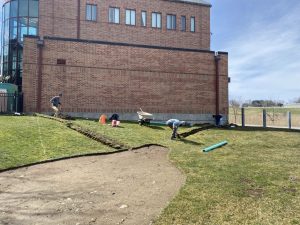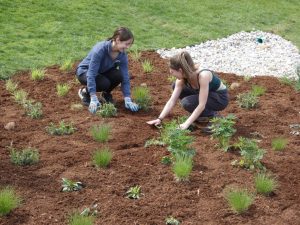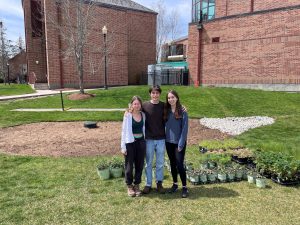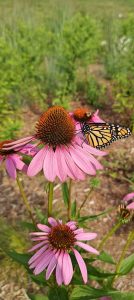Grass Be Gone: Bringing Native Plants and Effective Stormwater Management to UConn
Fall 2023 UConn Co-op Legacy Fellowship - Change Grant Project
Project Summary

Amanda, Indigo, and Trevor took the course Anthropology 3340E (Culture and Conservation) during the Fall 2023 semester, which is an Honors course, with an emphasis on service-learning. During this course, students had to engage with UConn and the surrounding community through a project that was service learning based and involved environmental stewardship. Amanda, Indigo, Trevor, and some of their fellow classmates looked to create a rain garden on campus to increase biodiversity and improve stormwater management on the UConn Storrs campus, increase awareness about rain gardens and their benefits, and involve the community in environmental action.
During the fall semester, these students researched rain gardens, the plants that go in them, their benefits, and how to build them. They collaborated and relied heavily on Rowan Solomon, another UConn undergraduate, for design and landscaping expertise. Amanda, Indigo, and Trevor then applied to the Change Grant to obtain the funds needed to build the rain garden. They had conversations with staff from UConn’s Facilities Operations, University Planning, Design, and Construction, and Extension to go through with finding a location on campus where they could build the rain garden, creating a design, and getting approval from administration. The project was approved by the administration in November 2023. Amanda, Indigo, and Trevor worked with Michael Dietz, a water resources extension educator with the College of Agriculture, Health and Natural Resources and Director of the Connecticut Institute of Water Resources, to identify an area next to the UConn Dairy Bar as the place where they wanted to build the rain garden. They selected this location due to the high levels of erosion, making it an ideal candidate for a rain garden, along with its high visibility due to its proximity to the Dairy Bar.

Preparation work for the site was done during the Spring 2024 semester. Amanda, Indigo, Trevor, and Mike disconnected the gutter downspouts from nearby buildings, dug trenches, and installed new drainage pipes that directed runoff from the building’s roof directly into the rain garden instead of into the stormwater system. Turf was then removed from the area, followed by new soil being spread and river rocks being placed where the pipes meet the rain garden.
In late April, the students ordered plants from Prides Corner, a local wholesale nursery. The plants in the rain garden include butterfly milkweed, lupine, aster, tickseed, bee balm, switchgrass, little bluestem, and prairie dropseed. All plant species chosen are native to the area and provide benefits for nearby wildlife. They also all function well in both dry and wet soil conditions.
 On April 19th the rain garden was officially installed! Amanda, Indigo, and Trevor along with some UConn staff and about 10 students put the plants into the rain garden. They will continue to monitor the growth and health of the rain garden during their time at UConn and will care for it when necessary. Additionally, UConn Soil Water Conservation Society will become the caretakers of the rain garden for longevity and sustainability.
On April 19th the rain garden was officially installed! Amanda, Indigo, and Trevor along with some UConn staff and about 10 students put the plants into the rain garden. They will continue to monitor the growth and health of the rain garden during their time at UConn and will care for it when necessary. Additionally, UConn Soil Water Conservation Society will become the caretakers of the rain garden for longevity and sustainability.
Read more about the project at UConn Today - "Tending Your Garden: New Rain Garden Installation Offers Lessons in Local Impact"
At the completion of this project, Amanda, Indigo, and Trevor have installed a 250 square foot rain garden that will help sequester about 60,000 gallons of stormwater a year from the roof of the neighboring buildings. They have also involved many UConn students throughout the duration of this project. One way they did this was by creating an online survey asking other students for their opinions on what UConn was already doing in terms of grass and stormwater management and if there were any changes they wanted to see on campus. They also asked students about what they already knew about rain gardens and if they would like to see one installed at UConn, furthering the emphasize of a student-led initiative. Another way Amanda, Indigo, and Trevor involved fellow students was by having some student volunteers help install the rain garden. This allowed for several students to gain a hands-on understanding of the installation process and benefits rain gardens can provide.
The Impact of Our Work
Rain gardens have many benefits, including increasing biodiversity, creating pollinator habitat, mitigating stormwater runoff along with erosion, and general beautification of an area. Amanda, Indigo, and Trevor also hope the rain garden inspires future student-led change to UConn. They believe more can always be done to promote social and environmental sustainability, and that change can be led by students.
About Trevor
Trevor is a rising senior pursuing a BA in Anthropology and Environmental Studies with a minor in Sustainable Community Food Systems. Trevor was interested in this project because of the intersection between environmental justice and the impact of biodiversity that rain gardens illuminate.
About Indigo
Indigo is a rising senior pursuing a BA in Anthropology and Political Science. Indigo was interested in this project because of the environmental benefits rain gardens would bring to the surrounding ecosystem, particularly with a focus on native plants, as well as the opportunity to educate the UConn community about green stormwater infrastructure and biodiversity.
About Amanda
Amanda is a rising junior pursuing a BS in Environmental Sciences with minors in Climate Science and Ecology and Evolutionary Biology. Amanda was interested in this project because of the focus on biodiversity and native plants, the opportunities it provided for student involvement in environmental action, and the fact that it provided a way for tangible positive change to be made on the UConn campus.
